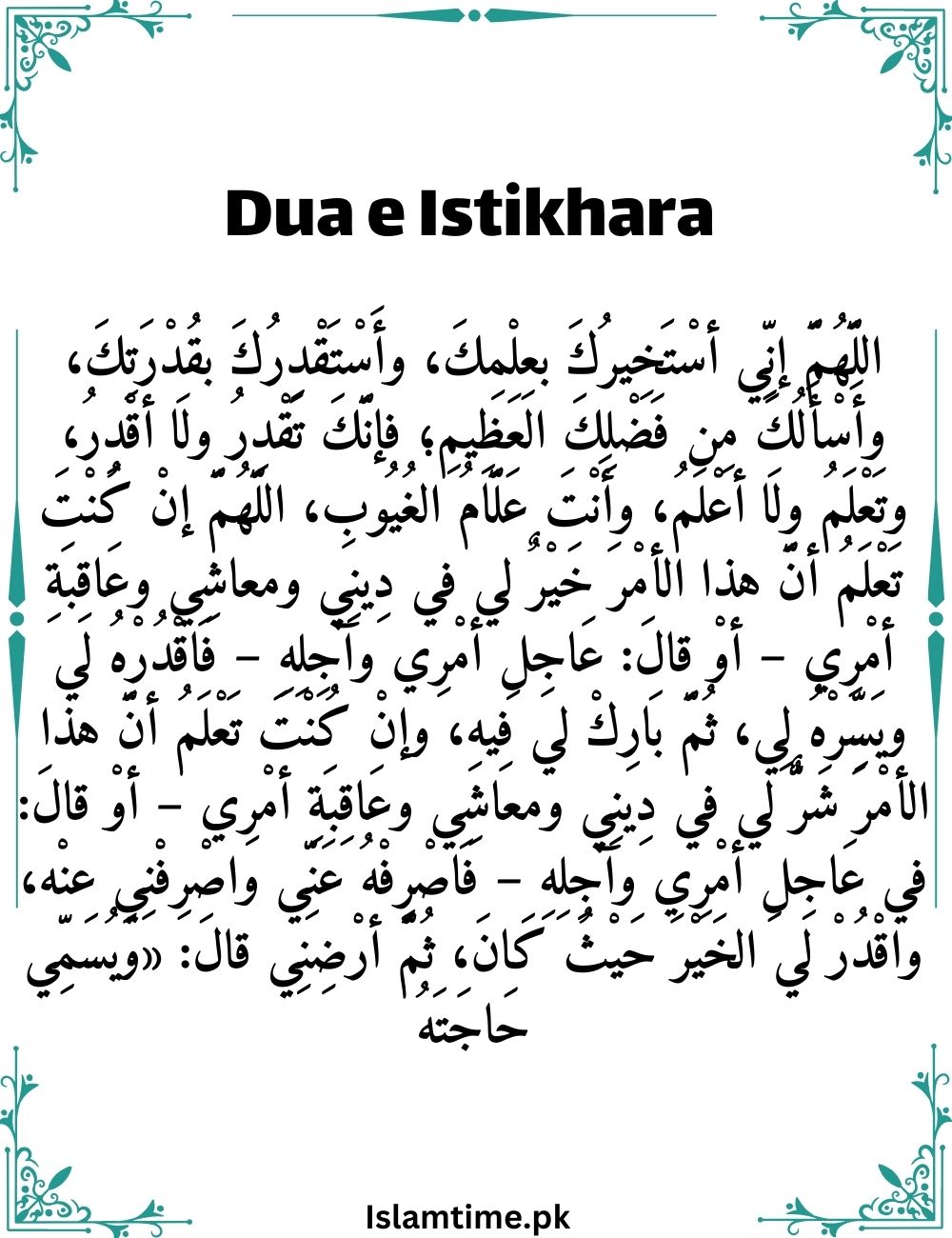Istikhara Krne Ka Tarika Dua ke Sath ( How to Do Istikhara with Dua? )

Salat al Istikhara ada krne Ka Tarika (How to Perform Istikhara Prayer)
Salat ul Istikhara, meaning the “Prayer of Seeking Counsel,” involves offering two units of prayer, known as Raka’ahs in Arabic, followed by reciting the Istikhara supplication.
It’s important to understand that these two Raka’ahs are similar to any other units of prayer in supererogatory prayers.
The basis for the Istikhara Dua can be found in various authentic narrations. One such narration states:
“When faced with a decision or uncertain about a course of action, one should perform two Rak’ahs and then make the supplication (dua)…
This narration is documented by Al Bukhari, from Jabir Ibn ‘Abdullah.
Istikharay ki Dua Arabic:
اللَّهُمَّ إنِّي أسْتَخِيرُكَ بعِلْمِكَ، وأَسْتَقْدِرُكَ بقُدْرَتِكَ، وأَسْأَلُكَ مِن فَضْلِكَ العَظِيمِ؛ فإنَّكَ تَقْدِرُ ولَا أقْدِرُ، وتَعْلَمُ ولَا أعْلَمُ، وأَنْتَ عَلَّامُ الغُيُوبِ، اللَّهُمَّ إنْ كُنْتَ تَعْلَمُ أنَّ هذا الأمْرَ خَيْرٌ لي في دِينِي ومعاشِي وعَاقِبَةِ أمْرِي – أوْ قالَ: عَاجِلِ أمْرِي وآجِلِهِ – فَاقْدُرْهُ لي ويَسِّرْهُ لِي، ثُمَّ بَارِكْ لي فِيهِ، وإنْ كُنْتَ تَعْلَمُ أنَّ هذا الأمْرَ شَرٌّ لي في دِينِي ومعاشِي وعَاقِبَةِ أمْرِي – أوْ قالَ: في عَاجِلِ أمْرِي وآجِلِهِ – فَاصْرِفْهُ عَنِّي واصْرِفْنِي عنْه، واقْدُرْ لي الخَيْرَ حَيْثُ كَانَ، ثُمَّ أرْضِنِي قالَ: «وَيُسَمِّي حَاجَتَهُ
Dua e Istikhara Transliteration:
Allahumma innee astakheeruka bi ilmika wa-astaqdiruka biqudratika wa-as’aluka min fadhlika al-adheem. Fa innaka taqdiru walaa aqdiru. Wa ta’lamu walaa a’alamu wa anta allaamul ghuyoob. Allahumma in kunta ta’lamu anna haadhal-amr (mention your concern) khayrun liy fiy deeniy wa-ma’aashiy wa-‘aaqibati amriy, faqdur hu liy wa-‘yassar hu- liy thumma baarik liy feehi. Wa in-kunta ta’lamu anna haadhal amr sharrun liy fiy deeniy wa-ma’aashiy wa-‘aaqibati amriy. Fa-srifhu ‘annee wa-srifni ‘anhu. Wa aqdur lial khayra haythu kaana thumma a-rdhiniy bihee
Dua e Istikhara in English Translation
“O Allah, I seek Your counsel through Your knowledge and I seek Your assistance through Your might and I ask You of Your immense favour, for indeed You alone decree fate while I do not, and You (alone) know (all things) while I do not, and You alone possess all knowledge of the Unseen. O Allah, if You that know this matter ( articulate matter) to be good for me as pertains to my religion, my life and livelihood and to the final outcomes of my affairs, then decree it for me, facilitate it for me, and then bless it for me. But if You know this matter to be harmful to me as pertains to my religion, my life and livelihood and to the final outcomes of my affairs, then distance it from me and distance me from it, then decree what is good for me – wherever it may be – and content me with it.”
Al Bukhari and others
Dua e Istikhara and Salat al Istikhara are powerful tools for seeking guidance from Allah in matters of importance. Let’s explore the essence of these prayers, their translations, and the method of performing them to seek divine counsel in making life’s decisions.
Dua e Istikhara serves as a heartfelt supplication to seek Allah’s guidance when faced with a choice or decision. Its translation allows us to understand the words we utter, enhancing our connection to the divine as we seek clarity and direction.
Similarly, Salat al Istikhara, the prayer of guidance, involves performing two rakats and reciting Dua e Istikhara afterwards. This methodical approach allows us to align our hearts and minds with Allah’s will, inviting His guidance into our decision-making process.
Understanding the translations of Dua e Istikhara and the method of performing Salat al Istikhara empowers us to seek guidance with sincerity and clarity. By following these steps, we open ourselves to receiving divine wisdom and making decisions that align with Allah’s plan for us.
Whether faced with major life choices or everyday decisions, Dua e Istikhara and Salat al Istikhara offer us a pathway to seek Allah’s guidance and find peace in our hearts. May these prayers serve as a source of comfort and direction as we navigate life’s journey.
In conclusion, Dua e Istikhara and Salat al Istikhara are invaluable tools for seeking guidance from Allah. By understanding their translations and performing them with sincerity, we invite divine counsel into our lives and find clarity in decision-making. Let us embrace these prayers as a means of seeking Allah’s guidance and finding peace in His infinite wisdom.